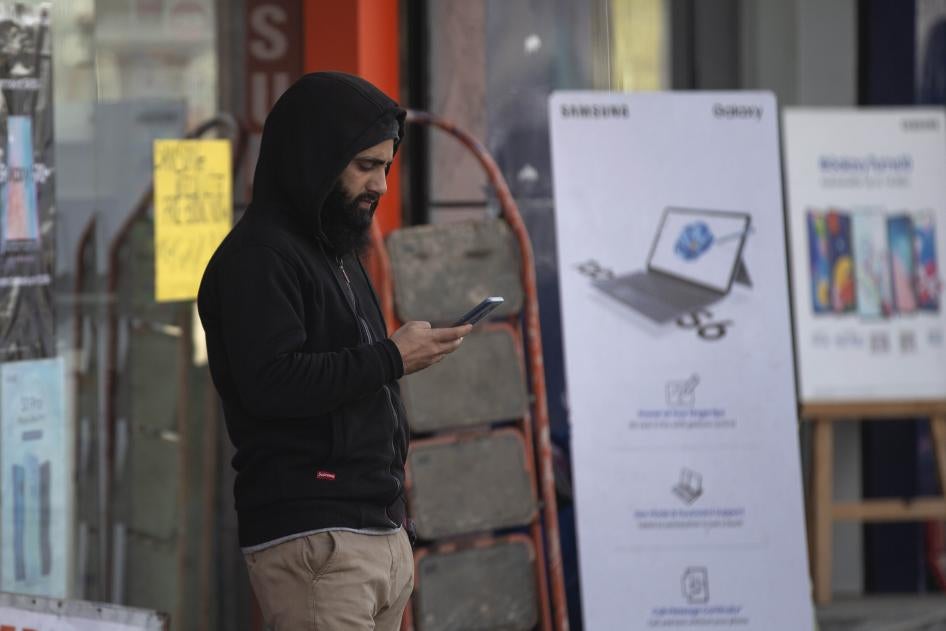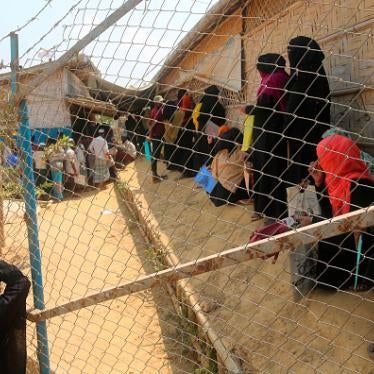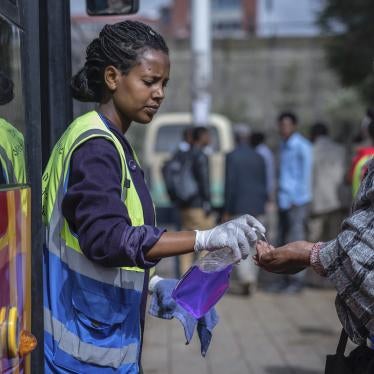UPDATE: Ethiopia announced that it would restore phone and internet service to western Oromia after a three-month shutdown.
(New York) – Intentionally shutting down or restricting access to the internet violates multiple rights and can be deadly during a health crisis such as the COVID-19 pandemic, Human Rights Watch said today. Governments that are currently imposing an internet shutdown, such as Bangladesh, Ethiopia, India, and Myanmar, should lift them immediately to save lives.
During a health crisis, access to timely and accurate information is crucial. People use the internet for updates on health measures, movement restrictions, and relevant news to protect themselves and others.
“Internet shutdowns block people from getting essential information and services,” said Deborah Brown, senior digital rights researcher and advocate. “During this global health crisis, shutdowns directly harm people’s health and lives, and undermine efforts to bring the pandemic under control.”
For people around the world staying at home, either willingly or because of government restrictions, the internet is critical to communicate with doctors, family, and friends. For many children and others seeking an education, it is needed to continue learning as schools shutter around the world.
Internet shutdowns can have a greater impact on women, lesbian, gay, bisexual, and transgender individuals, people with disabilities, and older people who may rely on the internet for online support services. These groups are most likely to rely on the internet to protect their physical safety, access sexual and reproductive health information and care, and participate in social, professional, and economic life, particularly when women are disproportionately taking on more child care and education responsibilities, and when isolation can lead to or exacerbate psychological distress.
The economic cost of internet disruptions is significant. As restrictions on movement expand, many individuals and businesses are relying on the internet more than usual for their work.
Internet shutdowns have become increasingly common in recent years, usually during tense periods, such as elections, anti-government protests, or armed conflicts. Thirty-three countries enforced 213 internet shutdowns in 2019, according to Access Now. Government justifications ranged from a need to combat fake news to public safety and national security.
India had the most internet shutdowns with at least 385 ordered since 2012. In Jammu and Kashmir, the Indian government imposed a complete communications blackout in August 2019, which stopped families from communicating and disrupted the local economy. Phone services were gradually restored, but it was only after the Supreme Court found the internet shutdown illegal in January 2020 that service was partially restored, and only at 2G speed.
Since COVID-19 spread to India, people have reported not being able to access websites that provide information about the pandemic due to highly restricted speeds that make accessing anything beyond text messages nearly impossible. The New Delhi-based Internet Freedom Foundation has called on the government to “make all tools including high speed internet available to doctors and patients to save lives.”
In Ethiopia, millions of people in western Oromia may be missing key information about COVID-19 because of a months-long government-imposed shutdown of internet and phone services. The shutdown has prevented families from communicating, disrupted lifesaving services, and contributed to an information blackout during government counterinsurgency operations in the area.
In Myanmar, the government is blocking the internet for more than one million people in Rakhine and Chin States. It first restricted access in eight townships in Rakhine State and one in Chin State last June, with an impact on civilians in conflict areas, the delivery of humanitarian aid, and the work of human rights monitors. The government lifted restrictions in five townships in Rakhine and Chin States in September but reinstated them on February 3, 2020.
In Bangladesh, an internet blackout and phone restrictions at Rohingya refugee camps are hindering humanitarian groups from addressing the COVID-19 threat. The shutdown jeopardizes the health and lives of nearly 900,000 refugees in Cox’s Bazar and the Bangladeshi host community.
Nearly four years ago, the United Nations Human Rights Council first condemned measures to prevent or disrupt access to or dissemination of information online and called on countries to refrain from such measures. Last week, leading international free speech experts said that internet shutdowns “cannot be justified” during the COVID-19 outbreak.
On March 27, the UN High Commissioner for Human Rights urged all governments to end any and all internet and telecommunication shutdowns. “Amidst the COVID-19 crisis, fact-based and relevant information on the disease and its spread and response must reach all people, without exception,” a statement said.
Under international law, governments have an obligation to ensure that any restrictions to information online are provided by law, are a necessary and proportionate response to a specific threat, and are in the public interest.
Officials should never use broad, indiscriminate shutdowns to stop the flow of information or to harm people’s ability to express political views, and doing so during a health crisis can cost lives, Human Rights Watch said.
Governments order internet shutdowns but internet service providers are responsible for carrying them out. Internet service providers should do everything in their power to push back against unjustified internet shutdowns, including by demanding a legal basis for any shutdown order and interpreting requests to cause the least intrusive restrictions. They should prioritize their responsibilities under the UN Guiding Principles on Business and Human Rights, and avoid complicity in human rights abuses, especially during the COVID-19 pandemic.
Providers should give customers advance notice of shutdowns and disclose the government’s role and legal basis for restricting networks and services.
Human rights organizations can join and participate in the #KeepItOn campaign coordinated by Access Now to fight internet shutdowns with documentation, advocacy, policy maker engagement, technical support, and legal interventions.
“During a global pandemic, when people around the world are isolated and access to information can mean life or death, it’s time to impose a moratorium on internet shutdowns,” Brown said. “Governments should ensure immediate access to the fastest and broadest possible service for all.”








